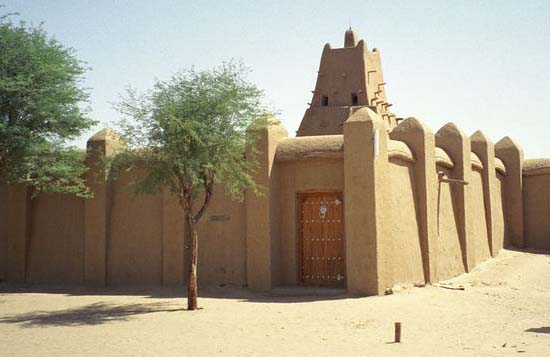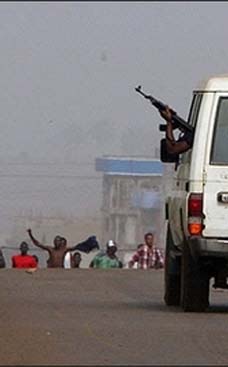
Kerry was in the Peace Corps in the country of Mali, an impoverished nation in West Africa caught between the Ivory Coast and Algeria, just west of Niger and east of Senegal. Timbuktu is 300 kilometers into the sand from Bamako, Mali’s capital city, served only by occasional supply vehicles in winter when the Niger River is little more than a swamp. When I arranged to spend three weeks with Kerry in February 1988, I announced my intention to ride a camel in Timbuktu. "Impossible this time of the year," Kerry said. But she found a way and hid our trip from the Peace Corps because Timbuktu was totally off-limits to Peace Corps volunteers when it could only be reached by overland travel. After a day in Bamako, she announced: "Pack! We’re gone."
In 1988 Mali Peace Corps Volunteer Kerry Clark found a way to travel to Timbuktu which was totally off-limits to Peace Corps volunteers and could only be reached by overland travel
Timbuktu proves challenging to reach, treacherous to leave
By BILL CLARK
Published Monday, March 5, 2007
Caption: Photo of Timbuktu. Photo: Flickr upyernoz Creative Commons Attribution 2.0
My sincerest apology to Wayne and Carla Anderson, the Tribune’s travel columnists, but Ol’ Clark would like to share with you a journey he made with his daughter, Kerry, in 1988.
Our destination was Timbuktu. I can assure you that Timbuktu is really a place, not a figment of the imagination, and is a destination I’m sure not many Columbians, including the much-traveled Andersons, have reached.
I recently enjoyed looking at a slide show I haven’t presented in years of our trip and relived an adventure that included a camel ride, an offer to buy a slave, a trip through the desert with bandits, a night of desert travel following only the stars and an auto repair job I still have trouble believing.
Kerry was in the Peace Corps in the country of Mali, an impoverished nation in West Africa caught between the Ivory Coast and Algeria, just west of Niger and east of Senegal. Timbuktu is 300 kilometers into the sand from Bamako, Mali’s capital city, served only by occasional supply vehicles in winter when the Niger River is little more than a swamp.
When I arranged to spend three weeks with Kerry in February 1988, I announced my intention to ride a camel in Timbuktu.
"Impossible this time of the year," Kerry said. But she found a way and hid our trip from the Peace Corps because Timbuktu was totally off-limits to Peace Corps volunteers when it could only be reached by overland travel.
After a day in Bamako, she announced: "Pack! We’re gone."
We rode a bush taxi half a day to Segou, took in a torrid Senegal prenuptial street dance and found a place on a truck loaded with bags of rice headed to Diré, where we had a chance to hitch a ride to Timbuktu.

Sands shift continuously in the desert, and there are no roads. Our vehicle soon became stranded in the soft sand. Scouts went ahead to find a solid path, and our driver lowered the tire pressure. A crew put corrugated strips the length of our wheelbase in front of the rear wheels, and we inched forward the length of those metal strips for hours until a solid track was located - all the time navigating by the stars. Thank goodness it wasn’t cloudy.
We burrowed into the cold desert to sleep, a desert that was 90 degrees in the daytime and 40 degrees at night. Talk about miserable! Two days on a rice truck is a lifetime.
Diré is the last contact with the United States before turning to Goundam and Timbuktu. The U.S. Agency for International Development once had a solar power plant there. In 1988, it housed a local diesel power plant, a monument to an array of failed aid projects. There was no diesel fuel, but the bird-watching was spectacular.
After a night in Diré, we found our way to Goundam and on to Timbuktu. Our "motel" was a small room with a hard bed, a mosquito net with a hole in it and a fan that seemed to heat the air it moved, but, surprisingly, the toilet had a stool instead of the usual hole in the floor.
The moment you hit town, your first move is to find a way out. We were able to leave within two days, but in the opposite direction from the capital city.
Timbuktu has been a city of mystery for centuries. Camel caravans reaching the Mediterranean with gold and precious stones had come from Timbuktu; the city was rumored to have streets paved with gold.
Actually, it was an oasis with three large wells where camel trails crossed. Except for water, there was, and is, little of value. The city has existed for years with the help of international aid agencies.
The highlight of the stay in Timbuktu was a camel ride into the desert to visit the Tuareg, the marauders of the desert for centuries. We turned down an offer to buy a black youngster being sold as a slave. Our knives soon came in handy.
I can assure you that camels are a long way from being friendly animals. They bite, spit and kick with world-class ability.
After two days of soaking up Timbuktu history and shooting 10 rolls of slide film, we boarded a Land Rover for Gao, a city near the Niger border. The fare was steep; you had no choice.
Halfway there, the vehicle stopped. We were told we had to pay again or remain in the desert alone. The shakedown was not a part of the original travel package. We paid, obviously, because we’re here.
Not long after the shakedown, the Land Rover stopped. It had been loaded with a dozen people and their baggage, and a rear spring had broken.
The driver had seen our long knives and asked if he could use one to cut a thorn scrub for use as a replacement spring. Amazing! He had found a scrub large enough to serve as a spare part, hacked out a 4-foot segment and lashed it over the axle, and we limped through the night to Borum where, astonishingly, a replacement spring was found.
We eventually made it to Gao and back across the country to Bamako. We passed through areas inhabited by the Dogon tribes, where people lived in cliff houses; stayed a day at a Peace Corps safehouse in Mopti; visited the magnificent mud temple at Djenni; and, after a 10-day trip that Ol’ Clark will never forget or make again, we arrived in Bamako.
During Kerry’s two years in Mali, I visited twice for a total of six weeks. I added 200 species to my bird list and amassed hundreds of wildflower slides, along with a slide story of Kerry’s mud stove program for the Malians in five villages south of Bamako.
The history of Timbuktu and the woman for which it was named, the story of the Tuareg camel caravans to Taoudenni and the prison salt mine there and the starkness of life told by the elaborate doors guarding the homes of both the rich and poor in Timbuktu all join with slides of the government buildings, which are on the "forbidden" list in telling the story of Timbuktu.
A suggestion: If Timbuktu is in your travel plans, either go in the summer or borrow Ol’ Clark’s slides.
Bill Clark’s columns appear Mondays, Wednesdays and Fridays. Reach him at 474-4510.
















